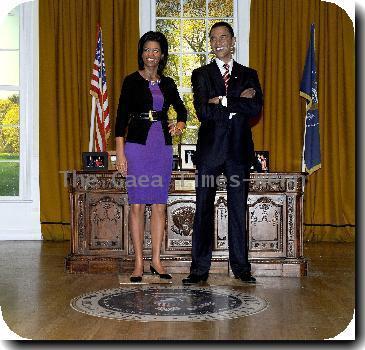Jurors start deliberating corruption charges against former Illinois Gov. Rod Blagojevich
By Michael Tarm, APWednesday, July 28, 2010
Jury begins weighing Blagojevich corruption case
CHICAGO — Rod Blagojevich’s fate was in the hands of jurors Wednesday as they began deciding whether the impeached Illinois governor tried to sell an appointment to President Barack Obama’s former Senate seat and schemed to use his political power for personal gain.
Jurors, weighing evidence against the second Illinois governor in a row to be charged with corruption, received lengthy instructions from the judge on how their deliberations should be conducted. Prosecutors loaded two carts of exhibits they introduced at the trial that a marshal would wheel into the jury room.
“I’m not expecting” a speedy verdict, Judge James B. Zagel said before jurors entered the courtroom.
After jurors left to begin their work, Blagojevich appeared relaxed. He cupped his hand over his mouth and said to someone in the spectator’s section, “Say a prayer.” One elderly spectator walked over and hugged him, also handing him a piece of candy.
He and his co-defendant brother, Robert Blagojevich, have rarely been seen speaking to each other during the trial. But they stood shoulder to shoulder in front of Zagel to say they both wanted to be exempt from having to come to court each time jurors have a question for the judge. The judge granted it.
During the trial, prosecutors portrayed Blagojevich as a greedy, smart political schemer determined to use his power to enrich himself throughout his administration, and who saw the opportunity to appoint Obama’s successor as the chance of a lifetime to get a lucrative and well-paying job in the administration.
By contrast, Blagojevich’s own attorney characterized him as an insecure bumbler who talked too much and had terrible judgment about who to trust — but never did anything to enrich himself.
Jurors ended the first day of deliberations and left around 5 p.m. Wednesday, courtroom deputy Donald Walker said. He said they’ll deliberate 9 a.m. to 5 p.m. on weekdays.
In more than an hour of dry legal language, and without any of the passion that the attorneys displayed in their closing arguments, Zagel not only explained the charges to the jury and what factors they were to consider but laid out the hurdles they must overcome to reach a verdict.
For example, an instruction that the jury was allowed to make “reasonable inferences” sounded mundane. But it also is the crux of prosecutors’ argument that, even if Blagojevich didn’t come right out and ask for money in exchange for signing a bill or approving state aid, they could conclude that was exactly what he was doing.
Zagel also explained that it is not illegal to accept a campaign contribution even if the contributor is doing business with the state or believes that a contribution will help business in the future — something that Blagojevich’s attorneys have been saying throughout the trial.
But, he said, a person can be guilty of extortion if he or she believes that not coughing up a contribution will hurt business in the future. Prosecutors contend that one witness, a children’s hospital executive, had feared if he didn’t make a $25,000 campaign contribution to Blagojevich the hospital would suffer financially.
Zagel told jurors they were not to draw any conclusions from the fact that Blagojevich did not take the witness stand. Defendants have a right to testify and they have a right not to testify, he said simply.
After a trial that relied heavily on wiretapped conversations between Blagojevich and his brother, wife and advisers, Zagel warned jurors that their personal feelings about wiretaps were not to enter the deliberations. He said the FBI acted legally in taping the calls.
The judge also reminded jurors that some prosecution witnesses received immunity in exchange for their testimony, and that their comments can be considered, but “with great care.” Similarly, he said other witnesses against Blagojevich pleaded guilty to charges and got benefits from the government, including reduced sentences. Zagel said jurors could consider their testimony but, again, “with caution and care.”
Zagel also told jurors not to guess about how a person would be punished, that it was the judge’s job to sentence a defendant.
Blagojevich, walking past reporters earlier, noted there were fewer people watching his arrival. “Where is everybody?” he asked. During the trial, Blagojevich would sometimes plunge into the waiting crowds to shake hands and sign autographs.
The ousted governor, 53, has pleaded not guilty to 24 counts, including trying to sell or trade an appointment to Obama’s vacated Senate seat for a Cabinet post, private job or campaign cash. If convicted, he could face up to $6 million in fines and a sentence of 415 years in prison, though he is sure to get much less time under federal guidelines.
His brother, Nashville, Tenn., businessman Robert Blagojevich, 54, has also pleaded not guilty to taking part in that alleged scheme.
The former governor suggested that he might spend some of the time waiting for a verdict running. He told reporters as he was leaving the courtroom that he ran six miles on Tuesday evening.
Tags: Barack Obama, Campaign Finance Improprieties, Campaigns, Chicago, Illinois, North America, Political Corruption, Political Fundraising, Political Issues, United States




